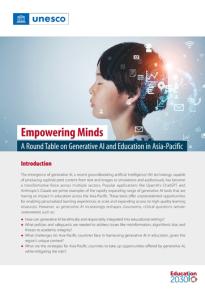Publication
Artificial intelligence and digital transformation

Digital transformations are continuously changing how people live, work and function in their societies. These applications of technology can be noticed in education, transportation, data storage, communications and healthcare, among other fields.
The development and use of digital technologies is also impacting how governments operate and function. Digital transformation, including artificial intelligence (AI) adoption, has become one of the highest priorities for public organisations. For instance, governments are increasingly trying to digitize their services through technology because of growing public expectations.
But today, some governments are asked to do more: to create an enabling environment in which green, inclusive, equitable digital transformation strengthens democratic societies and economies. Several stud-ies have indeed revealed critical digital competencies gaps in the public sector, including in the Global South. It is therefore extremely important to identify and address those digital transformation gaps and to succeed in the public sector, as a catalyst of change for societies and economies in digital age.
While there is a growing literature on the types of digital competencies that public sector officials need, there is an unmet need to develop comprehensive digital competency frameworks that can:
- clearly identify the internal challenges a government faces in its digital transformation journey;
- propose specific competencies that can address those challenges, and;
- take into account some specificities of the Global South.








